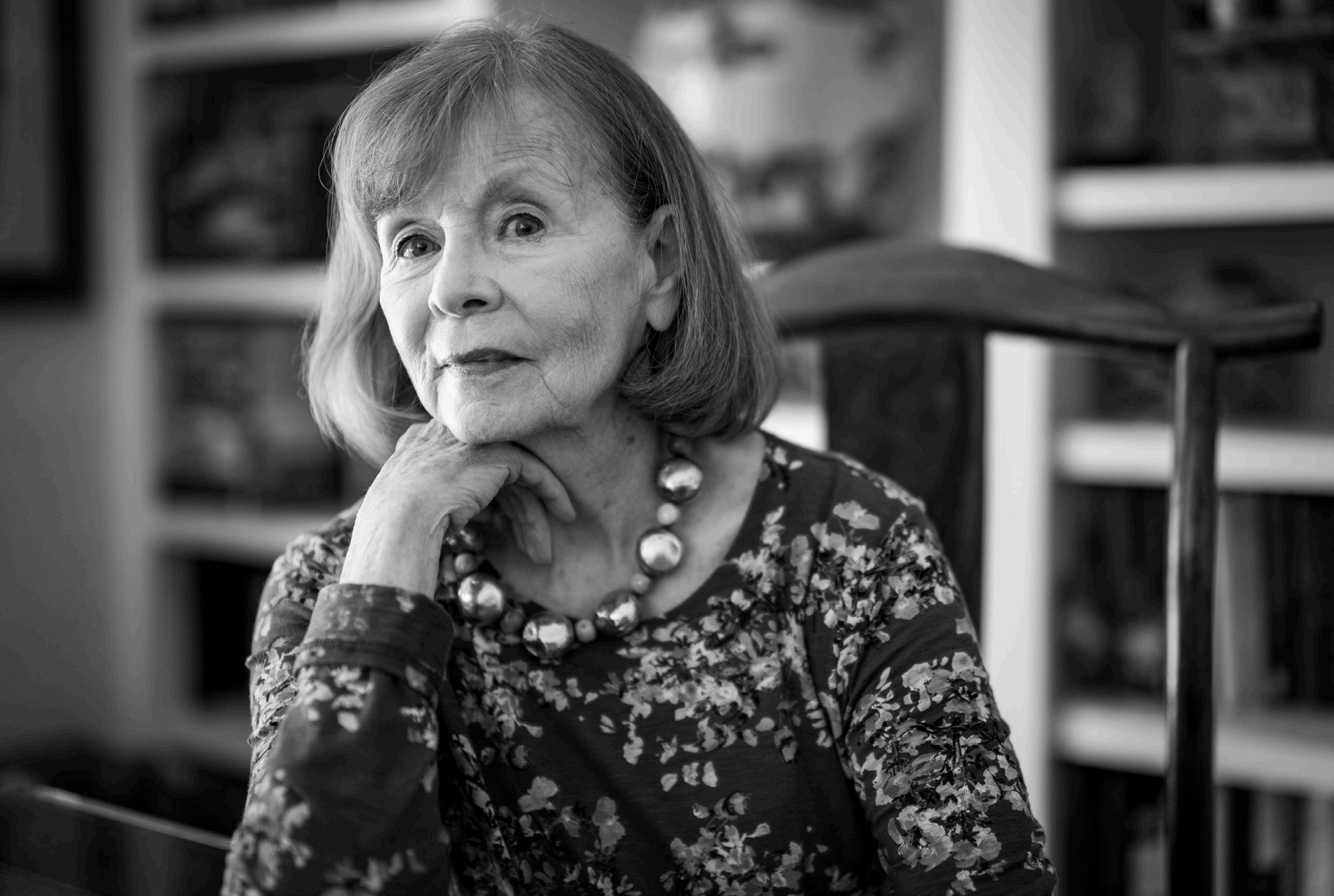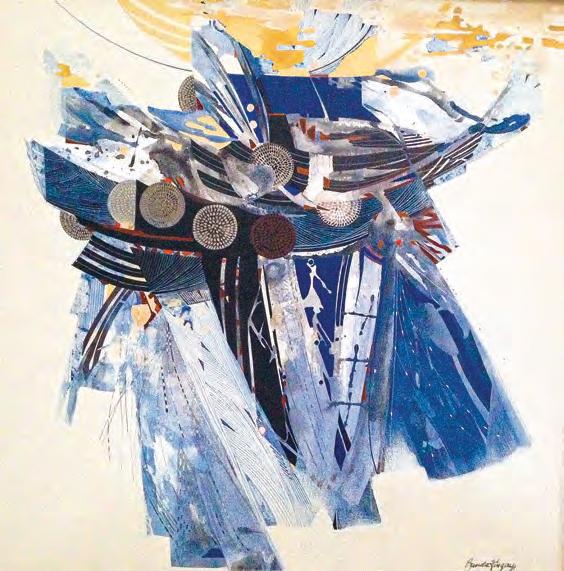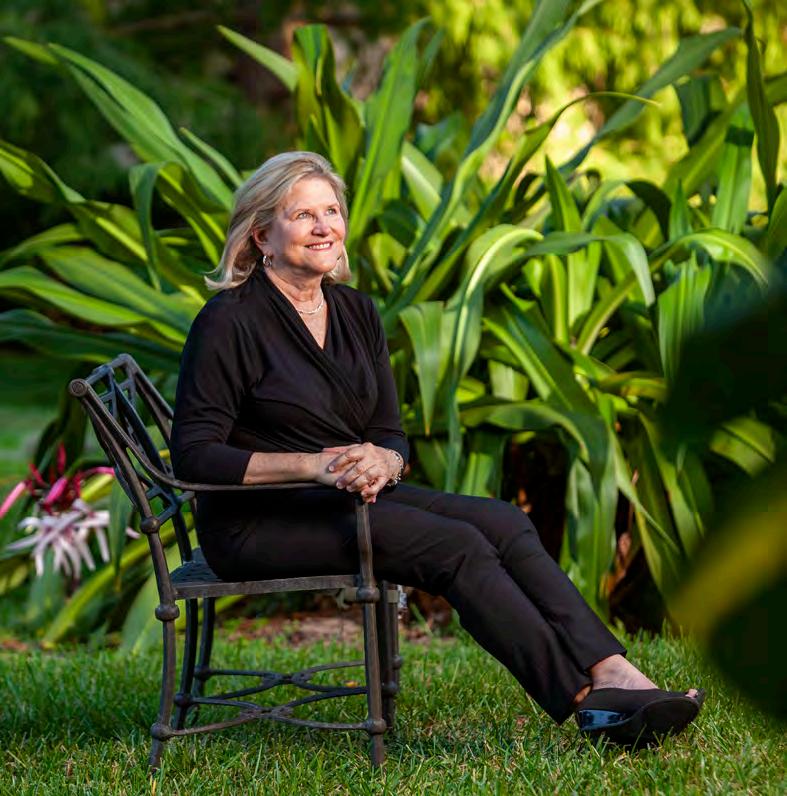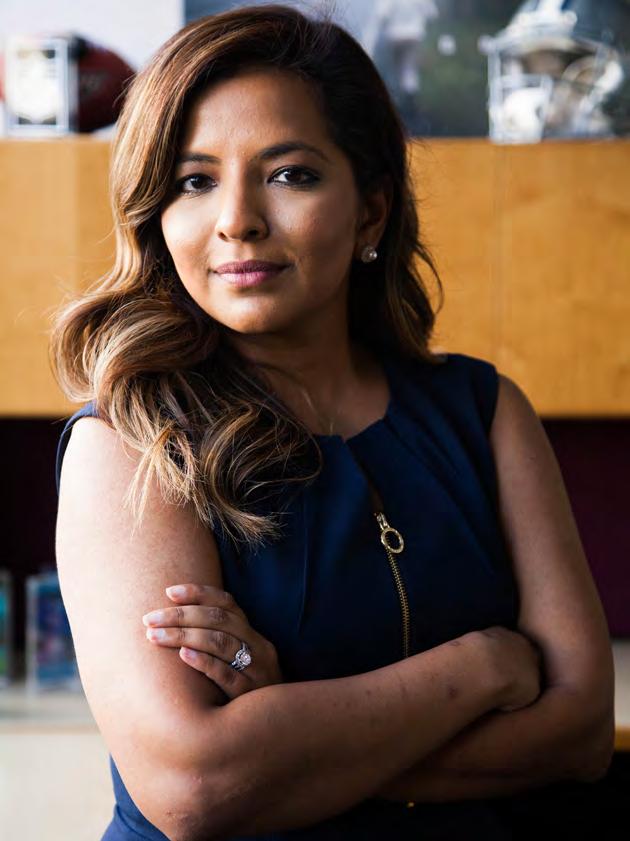
13 minute read
Talking About Our Generation
The first of Tri Delta’s Generation Z members have begun to graduate college. Today, Tri Delta’s more than 220,000 alumnae represent five generations: The Silent Generation, Baby Boomers, Generation X, Millennials and Generation Z. Each generation brings its own unique perspective, allowing women of all ages to learn from one another. Today’s college student looks very different from the college student of previous generations. But one thing has remained constant through the decades: the Tri Delta experience. Five alumnae — one from each generation — share how Tri Delta has shaped who they are today.

Brenda Smith Kingery, Oklahoma
Silent Generation
In April 2019, contemporary artist Brenda Smith Kingery, Oklahoma, (pictured above in her home), was inducted into the Chickasaw Hall of Fame, honoring Chickasaws who have made significant contributions to Chickasaw people or the Native American community.
The honor was a perfect celebration of Brenda’s career which has spanned half a century.
Brenda always loved art. “In grade school the teachers called my mother and said, ‘You have an artist.’” But rather than being given specific instruction,
Brenda was provided with art supplies and the freedom to be creative.
In 1957, that creativity led her to the University of Oklahoma by way of an art scholarship. It also led her to Tri Delta, her first pick of the sororities on campus. Already having friends who were members, moving into the Tri Delta house was a comfortable fit.
But Brenda’s college experience was vastly different from today’s college student, and even from her peers at the time. She married her high school sweetheart, Tom, as a sophomore, and by the time she graduated the couple had two children.
“I didn’t have as much time in the Tri Delta house as most did,” she says. But the time she did have in the chapter left a lasting impact on her. She remembers learning simple life skills, like having good manners, and deeper lessons like the importance of serving others.
For Brenda, juggling a marriage and a growing family with a full-time course load came with its own unique challenges. As a scholarship student, she was required to be enrolled in at least 15 hours a semester. Tom was also in school and working nights, and the couple lived in an apartment on campus. They shared a car with Tom’s sister and lived off eggs from his grandfather’s farm and sweet rolls from a friend’s father who was a baker.
“It was not glamorous at all,” says Brenda, looking back. “But I wouldn’t trade it.”
Brenda graduated with a bachelor of fine arts, and the couple moved to Japan, where she spent seven years diving into the culture and history of Asian art. But when her mother invited her to
come home to attend the Red Earth Pow Wow, it was a career changing experience. Brenda recalls being overwhelmed by the regalia, music and dancing — all of which would come to inspire her art.
Completing her MFA, Brenda had begun her career teaching art. But with a friend’s encouragement, Brenda decided to quit teaching and pursue painting full time.
“I thought if I don’t try it now, I never will. So I quit teaching to paint as a full-time artist. That was 40 years ago.”
Brenda has used her art to empower women in countries across the world, co-founding the organization Threads of Blessing. The organization teaches textile and design to women to help provide them with the means of supporting themselves.

In 2007, she was appointed by President George W. Bush to be a member of the Board of Trustees of the Institute of American Indian Arts (IAIA).
Her work with IAIA allows her to give back and support younger generations.
“Being on the Board of a university of Native Americans in the arts has taught me more than I ever imagined. I get to watch students, on scholarships like I was, getting this opportunity. It’s important to me to offer opportunities to people who may not have had a chance. It gives me great pride to see the students succeed.”
To Brenda, intergenerational relationships—specifically in the form of mentorship—are so important. “All of us Tri Delta alumnae have incredible stories, and I hope young people will be encouraged by them. As for me, I’m still learning, and I can still learn a lot from today’s college students. I’m amazed at the art that young people are creating today…I’m encouraged by it.”

Joan Bradbury Kayser, Florida
When Joan Bradbury Kayser, Florida, entered law school at Harvard University in 1971, she was one of only a handful of women there. Although Harvard Law School had begun admitting women in 1950, many in society didn’t believe women should be lawyers at all.
“Students didn’t really want women there,” Joan recalls. “They would say, ‘Why are you here taking up a man’s place?’ Sometimes there were certain professors—not all—whose method was to put people under pressure, and they would aim particularly at the women. You had to be thick-skinned and tough.”
For a woman, getting hired at a law firm after graduation was an other challenge. Joan went to New York City and landed a job at Cravath, Swaine & Moore, a firm that had been founded in 1819. Joan was only the 20th woman to have ever worked there.
In the workplace, there were people who thought she was a man before meeting her, simply because she was a lawyer. Also there were those who, when meeting her, assumed she was the secretary.
She credits her experience as a member of Tri Delta’s Alpha Psi Chapter with arming her with the confidence, poise and professionalism that helped her succeed in her career.
“ As Tri Deltas, we cared about how we represented each other in the house. We learned how to carry ourselves. As a lawyer I learned very quickly that I had to hold my own in negotiation with others who had been out there doing this a whole lot longer than I had. I had to be confident and poised at only 26 years old. Tri Delta is where I learned to do that.”
Joan was in college during the late 1960s — a tumultuous time period in U.S. history.
“It was the Vietnam era, the civil rights movement, and there was a lot going on. I was at a school that, although we had varied personalities in the house, the campus didn’t have a lot of diversity at all. I ’m very glad to see the campus has changed and is working on ways to improve. I’m glad to see that has changed in Tri Delta, too. A lot has gotten better, and I’m glad students still care about social issues.”
Joan practiced law in New York City before moving to Sarasota, Florida, where she continued to practice law for many years. She eventually transitioned into serving as trust counsel and overseeing senior trust administration for two major national banks. She has since retired.
She says her children and their families are her greatest source of joy and pride. Her daughter is director of donor engagement at the Sarasota Orchestra, and her son followed in her footsteps and is a partner at Cravath, Swaine & Moore, the same firm where she began her career.
Last year, Joan had a chance to attend a celebration at the firm, recognizing all the women who have worked there through the decades. While she had been just the 20th woman employed there, there were well over 1,000 women in attendance.
Gen X
When Kelley Moore Godfrey, Georgia, was in college in the mid ‘80s, her dream was to be a sportscaster or sports writer. But even as recent as the ‘80s, women sportscasters and writers were rare.

Kelley Moore Godfrey, Georgia
“In school women didn’t consider certain majors or careers—we were limited because it wasn’t what women did. It’s certainly not that way anymore.”
Instead of pursuing sports journalism, Kelley studied psychology. Today, she’s enjoyed a 25- year career with Delta Airlines and currently serves as general manager of employee engagement, communications, uniforms and community involvement for Delta’s technical operations department.
It was no surprise that Kelley joined Tri Delta’s Alpha Rho Chapter at the University of Georgia. She already knew some of the Tri Deltas in the chapter and had been invited to Tri Delta events while she was in high school. “I knew from the very beginning that I wanted to be a Tri Delta,” she says. “It was humbling for me, quite frankly, to be around such accomplished women from around the world. I learned to value other people’s opinions and I learned that everybody brings something of value. I learned to be kind.”
In Tri Delta, Kelley—who grew up with only a brother—found a group of sisters and lifelong friends. Today, she says, the group relies on technology they never had in school to stay connected and to be a source of support for one another. “We have a Facebook page we use to stay in touch with each other…through the good and the bad. Especially with my generation starting to lose parents, as Tri Deltas we have a whole support group built in. We’ve known each other since we were teenagers.” In fact, she credits her Tri Delta sisters for her career at Delta. It was a group of sisters that initially encouraged her to apply for a flight attendant job opening which eventually led to other opportunities in the company. It was also at Delta where she met fellow Tri Delta sister Allison Ausband, Georgia, senior vice president of in-flight service.
“When I first started out and was brand new, Allison helped me get my footing under me. I could ask her questions, and she would help me understand what was going on.”
Allison and Kelley had the opportunity to collaborate closely on a special project for Delta: redesigning the uniforms for Delta’s more than 60,000 frontline employees. They selected New York fashion designer Zac Posen and Lands’ End to create the uniforms.
Of working with Allison, Kelley shares, “When you have that connection already, working on a huge project makes it that much more special.” Kelley has seen the benefit of intergenerational relation ships throughout her workplace. “I think the intergenerational relationships are so important,” she says. “The newest generation of employees don’t have preconceived notions. They think outside the box, they’re innovative and they question why we do things certain ways. Delta is a 90-year-old company, and we need to stay nimble, innovative and creative to remain relevant.” Kelley has had the opportunity to “pay it forward” to younger generations, too. She was able to write a reference for the daughter of long-time friends who also ended up joining Tri Delta and who just graduated in May. “I’ve been so proud of watching her as she’s progressed. Everything comes full circle.”
Millennial

Sana Merchant-Rupani, Southern Methodist
Students in middle school and high school today have essentially grown up in a world where social media has always existed. For Sana Merchant-Rupani, Southern Methodist, who has built her career in social media, that wasn’t the case. Sana, who currently works as the senior manager of club social media strategy for the National Football League, attended SMU in 2007-2011. Social media, starting with platforms like Myspace, Facebook and Twitter, had only just been introduced and was uncharted territory. That meant that throughout college, Sana had the opportunity to learn with this new technology, as it first developed and evolved. “My generation was the first who were on social media connecting, talking and exploring there,” she explains, “We set the first line of behavior patterns on social media in terms of how things work and don’t work.” While social media has had a profound impact on Sana’s college experience and subsequent career, so has Tri Delta. The daughter of Indian immigrants, Sana didn’t have any idea what Greek life was about, but she took a chance on it.
“Tri Delta totally changed my college experience. It ended up being the greatest thing to happen to me in college. Through Tri Delta, you work with so many different people with so many different back grounds and personalities. You learn how to find the right balance between different perspectives. It taught me about responsibility, not just for myself but to others.”
Sana benefited greatly from the friendships Tri Delta helps its members develop. She credits her chapter advisors for teaching her not only about the professional world, but how to successfully navigate her college experience. She also saw the benefit of learning from those younger than her.
“No one person has it all figured out. Learning comes from both directions,” says Sana. “It’s important to understand what has been done before, and to get a new, fresh set of eyes. That carries over in the workplace. You work with your superiors who have been there before you to understand the big picture, but you bring in younger people who understand things you haven’t experienced. The world is always changing.”
Sana didn’t immediately begin her career in social media. After graduation, she went to work for a public relations agency and eventually landed a role as a public relations coordinator with the Empire State Building in New York City. It was there that she began exploring ways to utilize social media.
“I had always been into social media and used it personally. My boss was supportive and gave me the opportunity to apply that in a real world space. I shifted gears from PR to experimenting with social media—I was learning as I went along.” When she came across a job opening at the NFL, Sana applied. At the NFL, Sana advises all 32 teams on their social media strategy, looking at ways to deliver content that the fans will connect with. In November 2018, Sana was nationally recognized when she landed a spot on Forbes’ 30 Under 30 list, “featuring 600 trailblazers in 20 industries.” For Sana, the honor was both inspiring and motivating. Although she only graduated from college eight years ago, Sana already sees how different college today is from her experience. “There’s a lot more pressure now on students,” she notes. “It’s a different experience today.” At the same time, she says she’s noticed the consistent experience Tri Delta has offered its members through the decades. “A lot of my advisors who were in the chapter before me seemed to take away similar experiences. Though the generations might change and what is trending might change, the hope is that every Tri Delta generation is getting the same experience, learning, growth and support.”
Gen Z
Having just graduated in May 2019, Lauren Hornbeak, Baylor, is one of Tri Delta’s first Generation Z alumnae. The education major is starting her first year teaching high school biology at Cypress Creek High School in Houston, Texas, where she’s helping shape the next generation of students.
But teaching wasn’t always the path Lauren planned on pursuing. She admits, “I wasn’t going to be a teacher. I didn’t want to work in the classroom. I started college as pre-med because I wanted to be a physician assistant.”
But after shadowing a PA, Lauren quickly realized that career path wasn’t for her. She didn’t know which direction to take so she paid a visit to the career counselors who administered an aptitude test. Every one of Lauren’s top profession matches all had to do with education. After transferring to the School of Education, Lauren was placed in a school to see if she might like teaching. And just as quickly as she realized medicine wasn’t the right fit, she found her passion for the classroom.
“I fell in love with working with children. I love just being able to be their mentor, and pour into them every single day. It’s really special and not something a lot of professions get to do.”
Both her Baylor education, as well as her Tri Delta experience, has helped prepare her for life in the classroom. Fittingly, Lauren served as Beta Tau’s continuing education chair, where she had the opportunity to grow as a leader and educator. “Tri Delta taught me a lot about serving a group of people holistically.”
Learning to look at a problem and make decisions based on what would be best for the chapter overall is a skill she has carried with her into the classroom. “I have to decide how we will best prepare our students to be successful and determine what’s going to be best for them overall.”
She says that type of decision-making takes practice. And Tri Delta gave her a safe space to grow in confidence. “Tri Delta allowed us to practice, grow and become the adults we are today.”
As an educator, Lauren also recognizes that her college experience was very different from previous generations in the way the curriculum today is delivered. With technology today, students can immediately google the answer to any question. They no longer need to rely on memorizing facts and material. “ It’s less rote learning, and more about learning how to use the resources at our fingertips, and how to use them accurately,” Lauren explains.
That idea certainly bleeds into her own classroom. One of the biggest battles Lauren says she faces as an educator of the younger generations with shrinking attention spans is ensuring they are engaged in the classroom.

Lauren Hornbeak, Baylor
“Students today are used to being able to just get our their phones if they’re bored—I do that too. So it’s important that we create lessons where students are engaged, and we grab their attention from the second they walk in our door.” This means providing active and engaging lessons and creating activities that allow them to move around.
“I want to cultivate a classroom where they feel safe to make mistakes, be themselves and ask questions. Where they feel comfortable saying, ‘I just need to take five minutes to myself,’ if they’re having a bad day. I want them to be able to advocate for themselves because that’s super important in today’s society.”
Lauren is no doubt off to the right start. This summer, she was named the 2019 National Student Teacher of the Year by Kappa Delta Pi, the international honor society in education, and the Association of Teacher Educators. She says it’s a huge honor and a source of con fidence as she navigates her first year in the classroom. “Knowing that I ma y not be perfect but that I’m doing some things right…it’s a huge confidence booster.”



